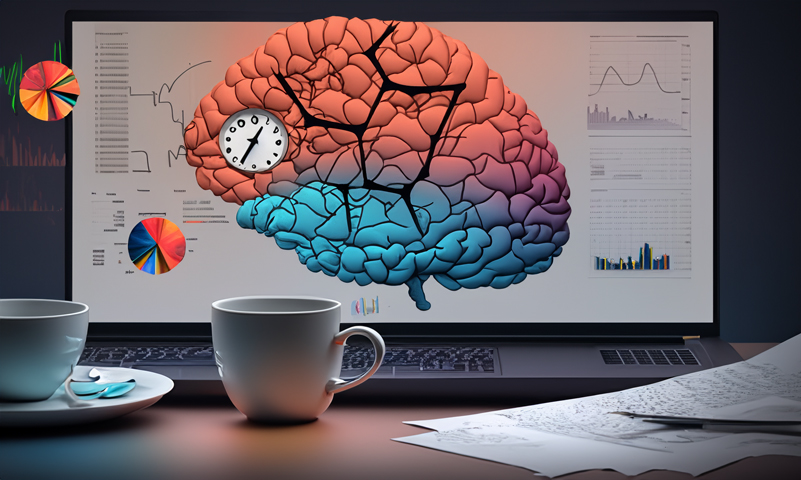Understanding Stress: Causes, Physiological Mechanisms, and Effective Management
Stress is a phenomenon that has always accompanied humans and has increasingly become the focus of research and society in recent decades. It is a response of the body to a perceived threat or burden, which can have both physical and psychological effects. Stress can occur in various forms, whether due to external influences, internal conflicts, or the way an individual reacts to certain situations. This essay will examine how stress develops in humans, the factors involved, and the mechanisms that occur within the body.
The Concept of “Stress”
The term “stress” was originally coined in physics to describe the internal resistance of materials to external forces. However, in psychology, it was introduced by Canadian researcher Hans Selye in the 1930s. He defined stress as the physical and mental reaction to demands or threats, which are referred to as "stressors." These stressors can have both physical and psychological origins and trigger different reactions in the body. It’s important to understand that stress is not inherently negative. There is a type of "eustress" that represents a positive form of stress, such as when it leads to improved performance. Negative stress, also called "distress," occurs when the stress level becomes so high that it impairs health and reduces well-being.

The Development of Stress: The Role of Perception
Stress primarily arises from the perception of a situation. Every person reacts differently to certain events or demands, and these reactions are strongly influenced by the individual’s assessment of the situation. A person who perceives a task as challenging and manageable might approach it with a positive attitude, while another person may perceive the same task as overwhelming and threatening.
The stress process begins when a person perceives a situation as challenging or threatening — whether due to external factors like time pressure, conflicts, or exams, or due to internal conflicts and worries. This perception then triggers a cascade of physiological and psychological reactions.
Physiological Mechanisms of Stress
The physiological response to stress is a complex chain reaction primarily controlled by the interaction of the nervous and hormonal systems. It can be divided into three phases: the alarm reaction, the resistance phase, and the exhaustion phase.
a) Alarm Reaction
The alarm reaction is the body’s initial response to stress. When a stressful situation is detected, the brain sends signals to the autonomic nervous system. This leads to the activation of the “fight-or-flight” response, preparing the body for a quick reaction. Stress hormones like adrenaline and noradrenaline are released, which increase the heart rate, deepen the breath, and tense the muscles in order to quickly respond to the perceived threat. During this phase, the body is particularly capable, as all resources are directed toward managing the stressful situation.
b) Resistance Phase
When the stressful situation persists over a longer period, the body enters the resistance phase. In this phase, the body attempts to restore balance and adapt to the stressful situation. The production of stress hormones such as cortisol is maintained to mobilize the body’s energy reserves. This helps manage the stress load and keep the body functioning.
c) Exhaustion Phase
When stress continues for an extended period and the body does not have enough time to regenerate, the exhaustion phase can occur. During this phase, the body is no longer able to maintain its normal functions, leading to a variety of health problems. Common symptoms of the exhaustion phase include chronic fatigue, sleep disturbances, concentration problems, and a weakened immune system.
Psychological and Social Factors in the Development of Stress
In addition to physiological processes, psychological and social factors play a significant role in the development of stress. A key factor here is the individual’s perception and evaluation of stressors.
a) Personal Factors
Personal traits, such as self-esteem, coping strategies (the ability to deal with stress), and resilience (the ability to recover from stressful events), influence how strongly a person reacts to stressful situations. People with high resilience, who are able to relax and cope with challenges, often experience less stress. In contrast, people with a high degree of perfectionism or low self-efficacy are more prone to stress.
b) Social Factors
The social environment also plays a crucial role in the development of stress. Social support from family, friends, and colleagues can help people better cope with stressful situations and improve their well-being. However, when this support is lacking, the negative effects of stress can be amplified. Relationships, workplace conflicts, or societal expectations can also act as stressors and increase stress levels.
c) Environmental Factors
In addition to individual and social factors, environmental factors can also contribute to the development of stress. Noise, overcrowded traffic situations, or an unhealthy workplace can significantly increase stress levels. In modern societies, where many people face high performance pressure, these environmental factors often have a significant impact on stress levels.
Long-Term Effects of Stress
Long-term stress can lead to a variety of health problems. The constant increase of stress hormones like cortisol can weaken the immune system and lead to chronic illnesses such as cardiovascular diseases, gastrointestinal disorders, or sleep disturbances. Psychological effects of prolonged stress can include anxiety disorders, depression, and burnout.
Stress Management and Prevention
To minimize the negative effects of stress, it is important to develop appropriate stress management strategies. This includes identifying and, if possible, reducing stress sources, practicing mindfulness, and planning regular recovery periods. Physical activity, healthy nutrition, and sufficient sleep are also essential factors in reducing stress and promoting overall well-being.

Conclusion
Stress develops in humans through a complex interaction of external and internal factors. The perception of stressors triggers a series of physiological and psychological reactions that manifest in different phases. While stress can be a helpful response in certain situations, prolonged stress can lead to health problems. To avoid the negative effects of stress, it is crucial to develop healthy coping strategies and take care of one’s health.
Comments 0
Write new comment: